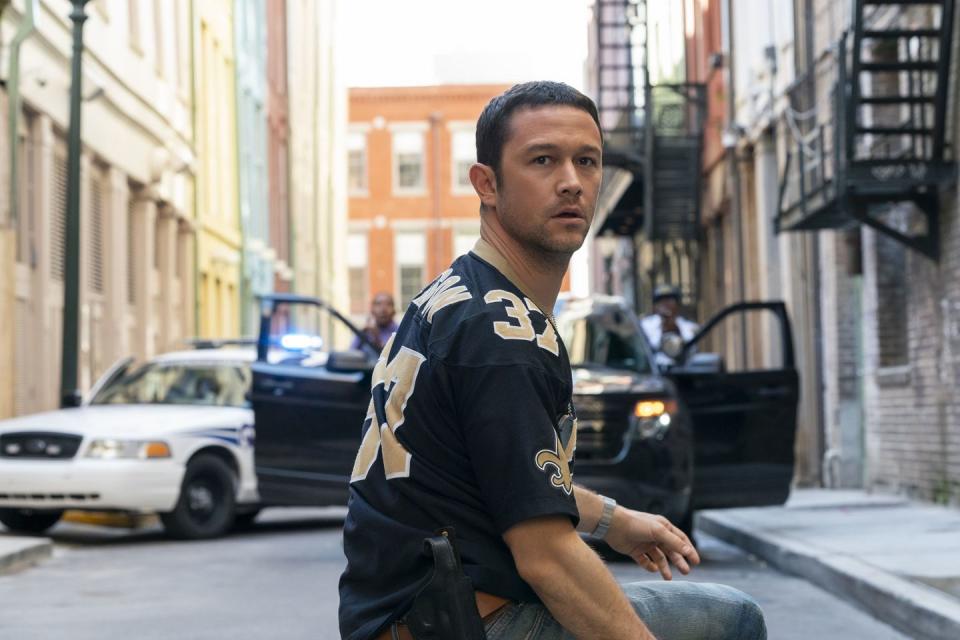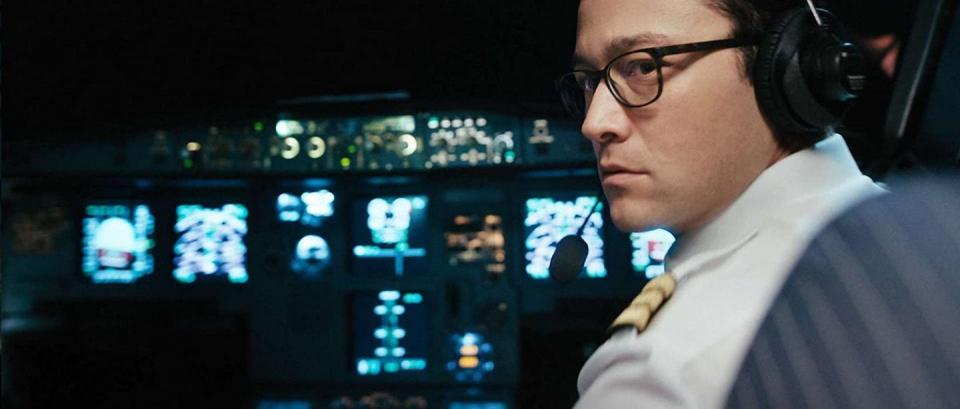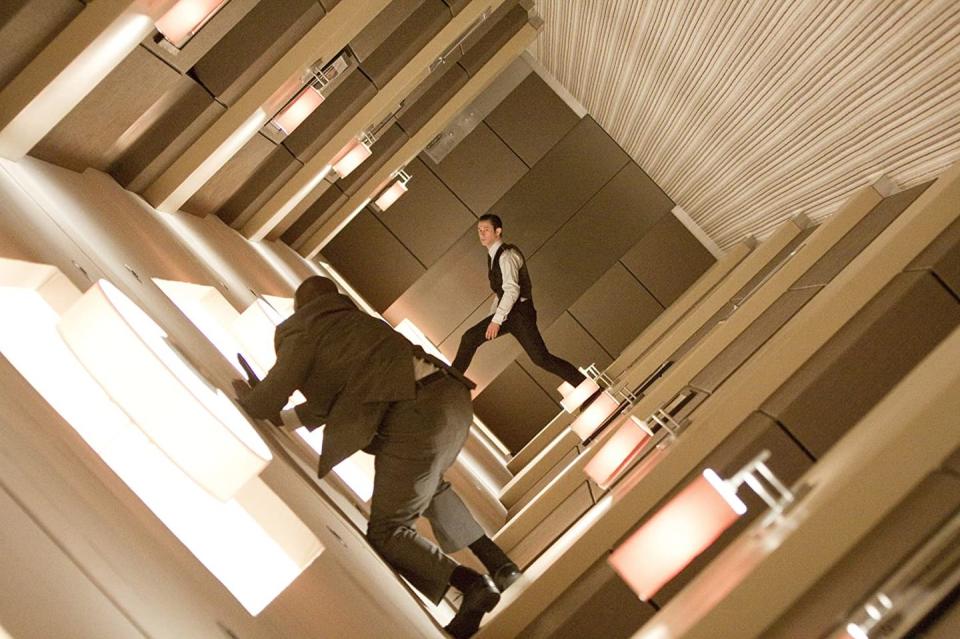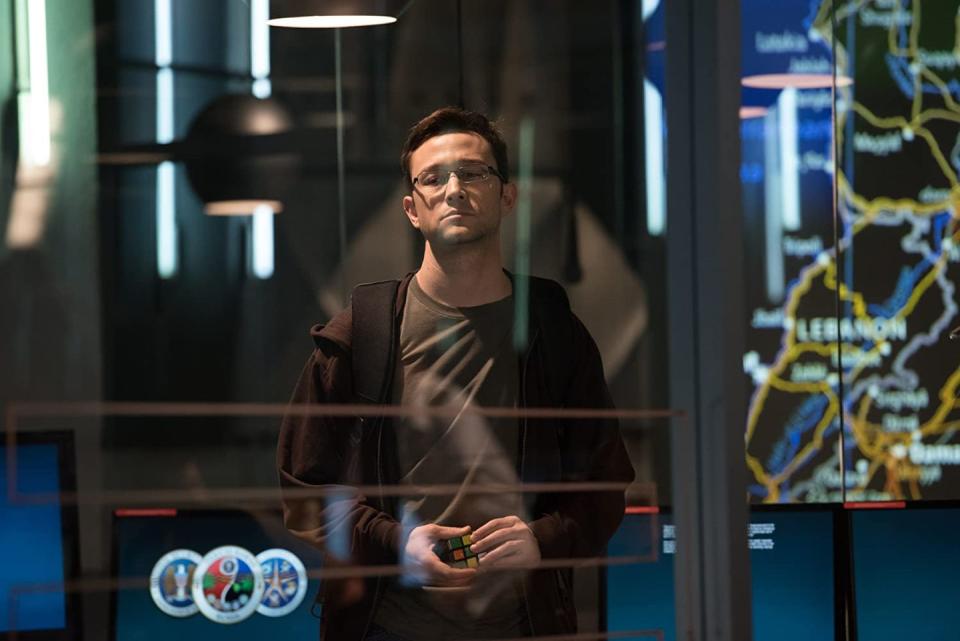Joseph Gordon-Levitt Is Back to Being a Movie Star Again
Joseph Gordon-Levitt was “just being stupid.” He was in New Orleans, riding a clunky Blue Bike with front basket. He was holding a fake gun with his right hand, gripping the brake handle with his left, and just going way too fast—like, stupidly fast. When the closed-off street suddenly ended, and just before traffic began, he squeezed his left hand—like, stupidly hard—locked his front tire, and face flopped over his handlebars.
“At first, I didn’t think it was that big a deal,” Gordon-Levitt says, now two years after filming what would become Netflix’s 2020 summer blockbuster, Project Power. “You know when you first get hurt? You can’t always tell. So I just jumped right up. I was like, I’m fine! Sorry, guys. Sorry. But within 10 or 15 minutes, I realized, Ohhh, I’m not fine.”
Gordon-Levitt is now safely at home in L.A. He's 39, but doesn’t look a wrinkle over 25. His hair hangs much longer these days—perhaps as long as its been since 3rd Rock from the Sun, the sitcom that first launched the JGL into the stardom stratosphere. Today, the flanneled Angelino has been ripping through Zoom interviews for several hours (“it’s a marathon”), but doesn’t seem tired or bored or disinterested. Everything he does and says is careful and deliberate. Since lockdown, he’s even discovered the careful deliberateness of washing dishes. Washing dishes is the opposite of riding a bike.
The last time Gordon-Levitt went head over handlebars (the bicycle is something of a fated object for the actor) was 2012, the year Gordon-Levitt was—all of a sudden—everywhere: The Dark Knight Rises, Lincoln, Looper. That year, while shooting his fourth film, the bike messenger thriller Premium Rush, he went through the rear window of a New York taxicab after a diplomat’s car drove on set and double parked. Several years later, and after a brief acting hiatus, the latest bike accident, he says, is all his fault. “And, yeah, I’m gonna stop being stupid.” (The injury wasn't major; he went to the hospital and returned to set with an icepack.)

So far in 2020, Gordon-Levitt’s filming decisions have turned out to be anything but stupid. In a year of closed theaters, all three of Gordon-Levitt’s projects are streaming. Before heading with Netflix to New Orleans, he shot what he says was the hardest role of his career, 7500, a film that takes place entirely in a cockpit and premiered exclusively on Amazon Prime. Gordon-Levitt’s third film of 2020 will be Aaron Sorkin’s The Trial of the Chicago 7 in September, also headed to Netflix.
This triad marks the return from a small filming hiatus for the 39-year-old, whose last major movie year was 2016—with the biopic Snowden. (He took a break when he first became a dad, and, in 7500, for the first time, Gordon-Levitt plays a father.)
Project Power might seem an odd choice for an actor whose last major roles were Oscar-flirting biopics (just before Snowden, Gordon-Levitt played French high-wire artist Philippe Petit in The Walk). The film tracks a new strain of narcotics, which grants users some animal ability such as strength or thermal resistance. It’s a low-high-brow sci-fi concept that tries to be both head-splatter mayhem as well as SparkNotes Foucault (and somehow kind of pulls off both). Gordon-Levitt calls it “fun,” and says it’s exactly what he needed at the time.
“I wouldn't describe 7500 as fun; it was rewarding in a very different way,” he explains. “I thought [Project Power] was going to be fun, and it was. And I think when people are having fun making a movie, audiences are gonna have fun watching it.”

The actor didn’t always seek out viewer enjoyment from his projects—and there may have been a time when admitting to having “fun” with bigger, more pyrotechnic films didn't sit so well.
Anyone over 30 will remember Gordon-Levitt straight off 3rd Rock and his cool, effortless swagger; between that hit sitcom and a starring role in beloved romantic comedy 10 Things I Hate About You, he may well have been the previous generation’s Timothée Chalamet. When he was 26, in an interview with the New York Times, Gordon-Levitt was dining on Manhattan snail, riffing on golden ratios, and saying things like, “Supermarket tabloids and celebrity gossip shows are not just innocently shallow entertainment, but a fundamental part of a much larger movement that involves apathy, greed and hierarchy.” (His directorial debut, Don Jon, satirized this very movement.)
Since then, Gordon-Levitt’s movie choices shake off any shred of pretentiousness. In fact, the actor has been pretty comfortable sliding back and forth between art house film-festival projects and larger tentpole entertainment. (Still, he stays away from blockbusters that are “clearly just commercial products, and I don’t need to name names there,” he says, grinning.)
“I like a variety—both as an actor and as a movie fan,” Gordon-Levitt explains. “I like watching some stuff that's really just easy to watch and fun. And then I also like watching some stuff that's gonna challenge me or make me feel uncomfortable or make me feel intense things or, you know, make me think.” Historically, he points to The Wizard of Oz as an example of the former, blockbusters with “a ton of heart and soul.”

This category may be Gordon-Levitt’s forte, and his most well-known films, including Christopher Nolan’s Inception and The Dark Knight Rises, fit neatly in this box: blockbusters with heart and soul. These are also the movies in which Gordon-Levitt plays support to another leading man—Leonardo DiCaprio, Christian Bale, Bruce Willis, Daniel Day Lewis, and, now, Jamie Foxx. For the majority of mainstream audiences, JGL is a sidekick.
But Gordon-Levitt doesn’t have to pick roles based on leading parts, a luxury, he has said, child stardom afforded him. (He did, however, almost score the role as Marvel’s Ant-Man.) He picks what he finds good.
“I don't really think the budget or the size of the movie is what makes it good or bad,” he explains. “It's really about: What's the story about? Who are the people making it? What are they putting into it?”
For the films in which he does take lead, Gordon-Levitt puts a hell of a lot into it, including precise biographical research and accent work. For Snowden, he actually flew to Moscow to meet with the exiled former CIA analyst. For The Walk, he was high-wiring six feet above the ground in a French warehouse with the real Philippe Petit, who suggested Gordon-Levitt walk with a “special, technologically-advanced, Russian-made safety harness that looks invisible,” i.e., no harness.

For Project Power, Gordon-Levitt reconnected with the city of New Orleans, where he’d previously shot Looper. This time around, the Big Easy would be a larger part of the story. (For the entirety of the film, Gordon-Levitt wears the jersey of former Saints player Steve Gleason, who helped lead the team to victory in their first home game following Hurricane Katrina.)
“As a very proud native Angeleno, I love Los Angeles. But, you know, there’s other places you can go and say, ‘Oh, this kind of reminds me of LA.’ Not New Orleans. New Orleans is just something really different.” He says he loves New Orleans’ “locality,” that while the rest of the country’s popular culture is national (musicians and artists from all over), New Orleans is homegrown, and Gordon-Levitt quickly rattles off local talent—like Trombone Shorty and Kermit Ruffins.
“I would love the whole world to kind of take that as an example. I think it’d be cool for culture to get back to a bit more of a local place. It's great that we're connecting with people all over the world, but it’s also really cool to look at your own hometown and appreciate that community that's next door.”
Gordon-Levitt isn’t just blathering about culture and music. Behind him when we talk is a large drum set; he also sings and plays piano.
For the last 16 years, Gordon-Levitt has run a collaborative platform called HitRecord, which he founded with his late brother, Daniel, and now staffs around 20 product designers and engineers. Users from next door to the other side of the globe can work together on multimedia projects. Some have been picked up by film festivals. (Gordon-Levitt briefly turned the website into a TV show, featuring short films based on poems and songs and episodes based on single concepts—like the word “one.”) During quarantine, he aimed to collaborate with at least one other creator every day and has been posting videos nonstop. His efforts inspire YouTube comments like: “Joseph Gordon-Levitt GETS the internet.”
It makes sense, then, that the actor/host/singer/creative would be down to stream, releasing blockbuster films less conventionally. But he doesn’t begrudge other creators for not adapting. When asked what he might say to filmmakers like Christopher Nolan, whose upcoming film Tenet has been delayed three times, resisting a streaming trade in hopes of a theatrical release, Gordon-Levitt shrugs.
“There's always gonna be an evolution of technology. And you know, for some people, they're gonna be more comfortable with the technology they're familiar with,” Gordon-Levitt explains. “The important thing is to listen to your own inspiration. And whatever gets you doing your thing, then that's great.”
For JGL, after four years, we’re just glad to see him doing more of his thing again—and staying in one piece.
You Might Also Like

